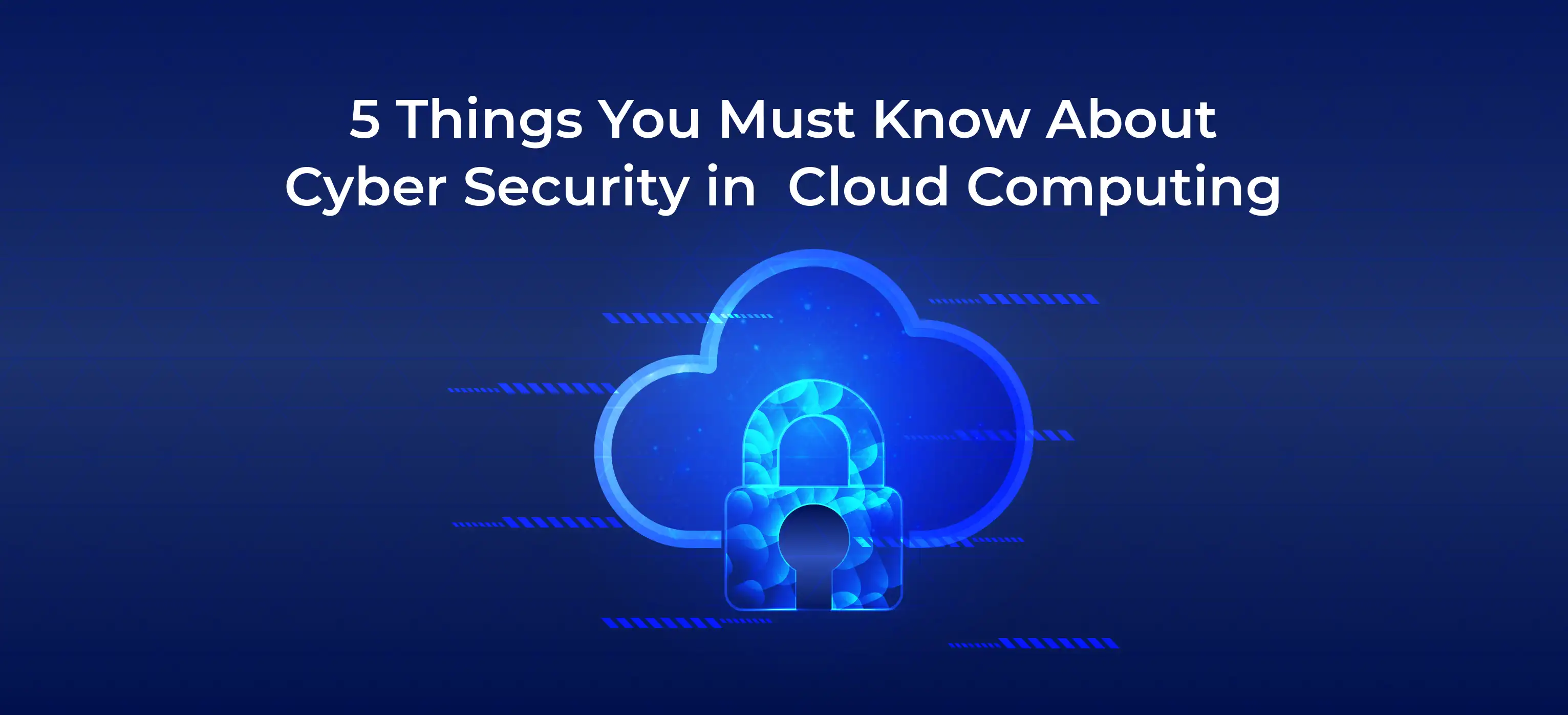 Piyush P
Sep 27, 2024
Piyush P
Sep 27, 2024

Cyber security and cloud computing may seem like polar opposites. The first calls for off-site data storage, while the second calls for creating virtual barriers to enclose and safeguard your data. Using the cloud involves outsourcing and putting your trust in a vendor to protect your data and transactions. Cyber security entails keeping everything in-house and putting your trust in the local team, processes, and standards to get the job done. Shouldn't these two strategies conflict?
As more and more companies migrate their processing and data to the cloud, the symbiotic relationship between cybersecurity and cloud computing is merging. The field of protecting cyber security when using cloud computing is being introduced; it is called cloud security. If you're still having trouble understanding the concept of cloud security, we've put up a list of five things you need to know about cloud cybersecurity.
Cyber security is measures taken for the protection of digital assets from dangerous and harmful attacks. This is done by careful monitoring of what has access to the system. Cybersecurity involves defending software, network services, and hardware from cyberattacks. These cyberattacks often aim to disrupt normal business operations, steal money from people, or access, alter, or delete sensitive data. Instead of using a local server or a personal computer, cloud computing uses a network of remote computers that are housed on the internet to manage, store, and analyze data.
Without the user's direct active administration, this is the on-demand availability of computer system resources, particularly data storage and computational power. Cloud computing relies on resource sharing to accomplish a pay-as-you-go model, which reduces capital expenses but may also result in unforeseen running expenses for users who are not aware of them. If you are interested in pursuing a career in cybersecurity then cybersecurity courses are good option for you to get started.
Protecting cloud applications and infrastructure from cyber predators requires the right in-demand Cybersecurity skills, tools and infrastructure. These cybersecurity capabilities must be used together to prevent attacks, manage your identity, and secure applications and infrastructure within your company. Here are 5 important things that you need to know about the future of cybersecurity in cloud computing.
Cloud service providers are aware of the need to play a role in cyber security. Still, ultimately, if a customer's data is compromised, the organization will be held accountable and might be compelled to pay a fine. Likewise, if an organization is the target of a ransomware attack, the organization is responsible for paying the hacker. This means that even if you're using cloud computing, you can still relax your security measures.
Misconfigured access controls on storage resources and neglected or inadequately protected networks, which are both the responsibility of the company and not the cloud vendors, are frequent causes of security breaches in the cloud. Even so, you must continue to give cybersecurity first priority, making sure your workforce is well-trained and up to date on the most recent threats and projections.
Also, read; Key Roles and Responsibilities of Cyber Security Professionals
A security solution is occasionally provided by cloud computing. Small and medium-sized organizations are more susceptible to assaults like ransomware because they lack the resources or haven't invested in enhancing their protection.
Because cloud companies, as previously said, offer some of the most sophisticated security in the IT industry, moving to the cloud may increase their overall security. In fact, some contend that transferring information to the cloud is safer than retaining it on-site, but some IT managers may find that difficult to accept given their innate desire to retain data in places where they feel they have the most control over it.
The Internet of Things poses a danger too much of the progress made in data centres, cloud computing, and network infrastructure security despite all of those accomplishments (IoT). IoT device proliferation leads to an increase in security issues because these devices frequently lack sufficient security (yet). They do this by giving you access to your files and even cloud services, undermining current cyber-security attempts. One analyst claims that the severity of the problems businesses deal with in the coming years as a result of these isolated security breaches will be comparable to a game of blows.
Cloud Computing service providers have already made significant investments in the security of their own products. When the primary players are Google Cloud Platform, Microsoft Azure, and Amazon Web Services, you can be assured safety has been given top priority, if for no other reason than self-interest—and some of the brightest minds have been given the job. They are currently focusing on assisting their clients in enhancing their security. Turn to your vendor for assistance if you are unsure of how well you are safeguarding accessibility and information on your end.
The General Data Protection Regulation (GDPR) comes into effect in May 2018. Although it only applies to people who live in the European Union (EU) and European Economic Area (EEA), it has a significant impact on businesses everywhere because people from these regions frequently transact business with people and businesses from other regions. After the GDPR, those firms and entities will need to ensure that their data practices are compliant. Although legal guidance is the best way to assure compliance, both the cloud provider and the cloud client must adhere to data protection procedures in general. Each solution for companies using a multi-cloud solution from more than one vendor must also comply. It's important to try to avoid making this difficult.
Without a shadow of a doubt, cloud computing is the way of the future, and cybersecurity will remain essential. When you consider everything, you could see how cloud security is the next step in IT growth as data volume and risk increase, legislation like GDPR make security enforceable, and future IoT technologies undermine it. Right now, it resembles a dense forest with no obvious way out. Stay informed, ensure you or your personnel are educated, and maintain a healthy amount of mistrust to stay ahead of your cloud security.
Do you want to upgrade to CEH v13 AI?
Get Edoxi’s CEHv13 AI Training and become an Upgraded Certified Ethical Hacker!
Here is the list of other major locations where Edoxi offers Cloud Computing Certification Course
Cloud Computing Courses in Dubai | Cloud Computing Courses in Qatar

Microsoft Azure Certified Data Science Trainer
Piyush P is a Microsoft-Certified Data Scientist and Technical Trainer with 12 years of development and training experience. He is now part of Edoxi Training Institute's expert training team and imparts technical training on Microsoft Azure Data Science. While being a certified trainer of Microsoft Azure, he seeks to increase his data science and analytics efficiency.